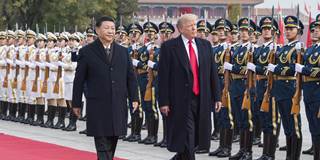The Trump administration seems to believe that America has reached a propitious moment in the economic cycle to play power politics. But can this approach offset the increasingly tenuous fundamentals of a saving-short US economy that continues to account for a disproportionate share of global military spending?
NEW HAVEN – With each passing day, it becomes increasingly evident that US President Donald Trump’s administration cares less about economics and more about the aggressive exercise of political power. This is obviously a source of enormous frustration for those of us who practice the art and science of economics. But by now, the verdict is self-evident: Trump and his team continue to flaunt virtually every principle of conventional economics.

NEW HAVEN – With each passing day, it becomes increasingly evident that US President Donald Trump’s administration cares less about economics and more about the aggressive exercise of political power. This is obviously a source of enormous frustration for those of us who practice the art and science of economics. But by now, the verdict is self-evident: Trump and his team continue to flaunt virtually every principle of conventional economics.